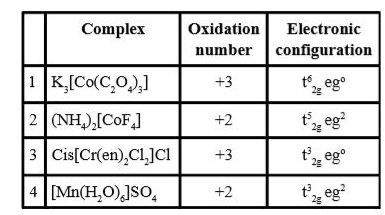Which of the following is not a condition for complex formation?
Small atomic size
High nuclear charge
Variable oxidation states
Availability of vacant d orbitals
The correct Answer is:c
To determine which of the following is not a condition for complex formation, let's analyze the key factors that contribute to the formation of complexes.
1. Understanding Complex Formation: Complex formation involves the interaction between a metal ion and ligands, which are molecules or ions that can donate electron pairs to the metal.
2. Small Atomic Size: A small atomic size of the metal ion is essential because it allows for stronger interactions with the ligands. Smaller ions can approach ligands more closely, leading to stronger bonds.
3. Higher Nuclear Charge: A higher nuclear charge in the metal ion enhances the attraction between the metal and the ligands. This increased positive charge can stabilize the complex, making it a favorable condition for complex formation.
4. Availability of Vacant d-Orbitals: For transition metals, having vacant d-orbitals is crucial. Ligands donate their electron pairs to these vacant orbitals, forming coordinate bonds. Without vacant d-orbitals, complex formation cannot occur.
5. Variable Oxidation State: While variable oxidation states are a characteristic of transition metals and can influence the types of complexes formed, they are not a necessary condition for the formation of complexes. Complexes can form even if the metal ion does not exhibit variable oxidation states.
Conclusion:
Based on the analysis, the correct answer is that variable oxidation state is not a necessary condition for complex formation.
Final Answer:
Variable oxidation state is not a condition for complex formation.
---
Based on the analysis, the correct answer is that variable oxidation state is not a necessary condition for complex formation.
Variable oxidation state is not a condition for complex formation.
Similar Questions
Knowledge Check
Which of the following is the conditional p→q is
Aq is sufficient for pBp is necessary for qCif p then qDIf q then p
Which of the following is a conditioned reflex action?
View SolutionWhich of the following is incorrectly matched complex?

View SolutionWhich of the following condition favours the bond formation?
View SolutionIn the formation of nitric acid, N2 and O2 are made to combine. Thus, N2+O2⇔2NO+Heat which of the following condition will favour the formation of NO?
View SolutionWhich of the following is a π – complex
View SolutionWhich of the following is/are inner orbital complex ?
View SolutionWhich of the following is a colourless complex ion?
View Solution
